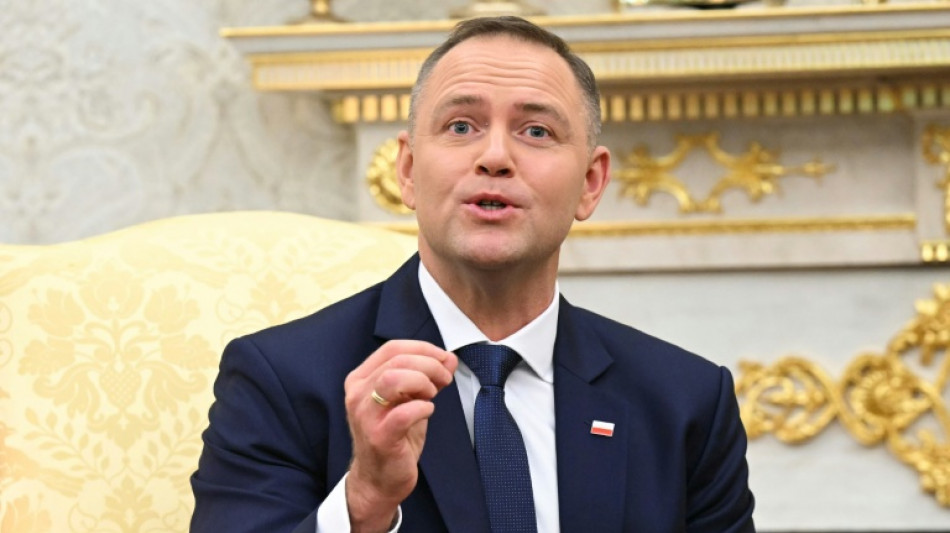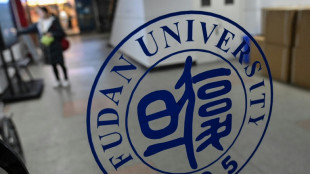

Polish president critical of Germany to visit Berlin
Polish President Karol Nawrocki is due in Berlin for talks on Tuesday, with his past criticism of Germany looming over Warsaw's diplomatic drive to bolster allied support after a Russian drone incursion.
Poland is seeking greater military and political backing after its army, together with its NATO allies, scrambled jets to down Russian drones violating its airspace early on Wednesday.
While Russia denied targeting its eastern European neighbour, Polish Prime Minister Donald Tusk warned his country was closer to "open conflict" than at any point since World War II in the wake of the intrusion.
Nawrocki -- a right-wing nationalist who has often locked horns with Tusk -- is to meet German Chancellor Friedrich Merz and President Frank-Walter Steinmeier on Tuesday before travelling to Paris.
The political novice was elected in June and is a former director of the Institute of National Remembrance, which is responsible for prosecuting historical Nazi and Communist crimes.
A fervent admirer of US President Donald Trump, Nawrocki has repeatedly accused Germany of treating Poland as a "minor partner" and of sending undocumented asylum seekers back to Poland.
On the election campaign trail, he vowed to demand reparations from Germany over the treatment of Poles during the Second World War -- a position that sets him at odds with Tusk's pro-European government.
Nearly six million Poles, including three million Jews, died during World War II.
Nawrocki repeated his reparations call on September 1 during commemorations of the invasion of Poland in 1939 by Nazi Germany and the Soviet Union.
While Poland needed clarity in its relationship with Germany, it also needed financial compensation, he argued.
Analyst Wojciech Przybylski said Nawrocki might use his trip to Berlin to appeal to his electoral base at home, which is strongly anti-German.
In 2022, the right-wing nationalist government in power in Warsaw at the time estimated Polish losses during the Second World War at 1.3 trillion euros ($1.5 trillion).
Germany argues that Poland renounced any claim to reparations in 1953, while under pressure from the Soviet Union, and has similarly countered reparations claims from Greece.
- German show of support -
Merz's spokesman Stefan Kornelius said on Friday that the German chancellor had taken note of Nawrocki's remarks but the German government's position remained unchanged.
Shortly after Nawrocki's election, Kornelius said Berlin's stance did not imply that "the issues of remembrance and reconciliation with the past are definitively closed", but that any further action must take a form other than financial reparations.
The Polish foreign minister, Radoslaw Sikorski, has said seeking financial compensation is futile, arguing that Poland should resign itself to that fact in the name of Polish-German relations.
But he recently suggested that Berlin could make a gesture by investing even more than at present in the defence of Poland -- an EU and NATO member that shares a border with Ukraine, Belarus and Russia.
Sikorski was speaking before what Warsaw called the incursion of 19 Russian drones into Polish airspace during the night of September 9-10.
Warsaw's NATO allies responded by saying they would bolster Poland's air defences on its eastern border, with Germany doubling the number of Eurofighter jets it deploys to protect Warsaw's flank to four.
That backing from Berlin undermines Nawrocki's position, as it shows Germany has cards to play on security matters, said Kai-Olaf Lang of the German Institute for International and Security Affairs.
And Nawrocki's well-documented fondness for Trump has also weakened the Polish president's position, said analyst Marcin Zaborowski from the Globsec think tank.
Trump took Poland's government and public aback on Thursday by saying the drone intrusion may not have been intentional and "could have been a mistake".
"We're getting signals that Washington might not help us in these difficult times," Zaborowski told AFP.
That called into question Nawrocki's strategy of staking everything on an alliance with the United States and "should have an impact on what he says in Germany and France", Zaborowski added.
L.Lozano--ECdLR






